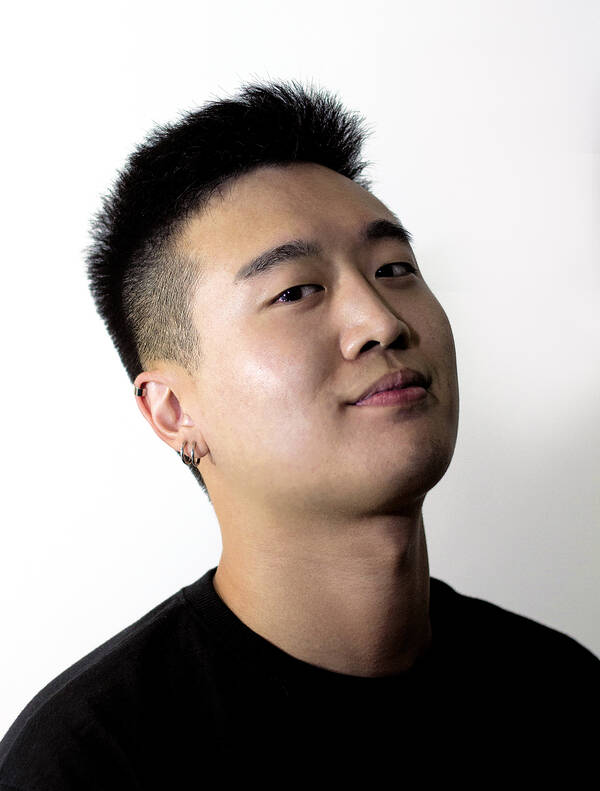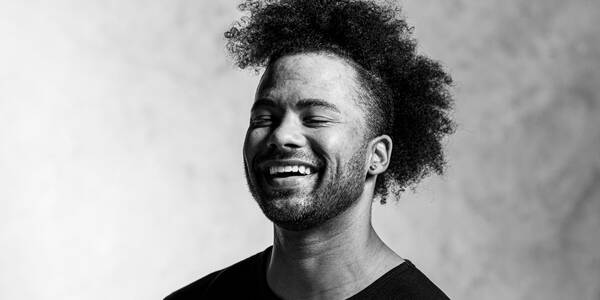
profile / alumni / environmental-design / diversity / spring-2021
April 09, 2021
By Solvej Schou
Images courtesy of Chahn Chance
ENVIRONMENTAL DESIGN ALUMNUS CHAHN CHANCE FINDS HIS FREEDOM AND HIS CREATIVE VOICE
On his first day of class in 2016 as an Environmental Design student, Chahn Chance (BS 20) had a breakthrough moment in his life.
“All the Environmental Design students had dinner together after school,” Chance says via Zoom, several days into 2021, from his apartment in Seoul. “Then someone asked me, ‘Hey Chahn, do you have a girlfriend?’ I said, ‘No, actually, I'm gay.’ It was my first time being out to a stranger. I didn't have to lie or hide. Everyone was accepting. I was myself. Starting that day, I was able to explore design as a field of possibilities, of big ideas.”
A hybrid designer who merges graphic design and branding with spatial experience design, Chance views his personal and professional journey of self-expression and barrier breaking—from being a timid teenager to an open and confident gay adult—as going hand-in-hand.

I always design with emotions, through space and mood.
Chahn ChanceEnvironmental Design alumnus

His 2020 virtual Grad Show project Artisus is a multicultural art and dance music venue concept that champions diversity and inclusion and was inspired by Chance’s experience being in ArtCenter’s Exchange and Study Away program in Berlin. Airy and open, with rows of archways, it features posters with slogans like, “I know it’s tough, but you just need to believe in yourself.” After graduating from ArtCenter, Chance moved from Southern California to Seoul. In November, he started working as a multidisciplinary designer at Joongho Choi Studio.
“I always design with emotions, through space and mood,” Chance says. “In the past, in Korean culture, being emotional was considered a weakness. But Korean culture is drastically changing. I think that expressing emotions is powerful.”
Born in Maryland and raised in South Korea, with dual American and South Korean citizenship, Chance grew up in a strict conservative Christian household with his father, an engineer, and his mother, who had an interest in design. “I was very suppressed,” he says. When he was 13, he moved by himself to Austin, Texas, to study at a private Christian school, and he later attended a large public high school. “In Texas, I felt the absence of acceptance of people who are different, and that's why I'm obsessed with diversity and inclusion now,” Chance says.

A love of cars motivated Chance to apply to ArtCenter’s Transportation Design program. After attending for three terms, he had to report for military duty in South Korea, where all men are required to serve for two years. There he fell in love with another soldier, his friend.
“I had my first romantic relationship in the army, which was super illegal,” says Chance, pointing out that LGBTQ+ relationships are banned in South Korea’s military. “It was a moment for me to accept that I'm different,” he adds. “I realized in the army that I was living up to others’ expectations, and I decided to find my path once I got discharged.”
Chance came back to ArtCenter and switched to Environmental Design. Then he threw himself into projects. Besides approaching spatial experience design with emotions, he also incorporates people’s voices and interconnection. “I start a project with branding, born of an identity, and express that identity through graphic visualization and spatial experience,” he says.

His exhibition concept Invisible invited guests to walk through the lives of Korean LGBTQ+ teenagers, who are invisible in society, he says. He designed a Military and Veteran Ally challenge coin as a student Creativist working with ArtCenter’s Center for Diversity, Equity and Inclusion (DEI). Professors James Meraz and Emil Mertzel especially inspired Chance.
Studying away in Berlin in 2018, “I felt like I was reborn,” says Chance, widening his eyes. “My mom wanted me to dress like a ‘good Christian son,’ and I had always dressed like that, in a uniform,” he says. “In Berlin, I reclaimed my body. I got into techno music culture. Venues were so diverse and open, with everyone dancing together.” On Zoom, wearing a colorful knit beanie hat, Chance pulls up the sleeve of his grey sweater to show off his first tattoo—a dagger—which he got in Berlin. In 2020, he came out to his parents.
Chance now aspires to be an art director. He also gave himself a new last name, replacing the last name—Sung—that he was raised with.
“In Korean culture, people sometimes add an ‘s’ at the end of a person’s first name,” he says. “It makes my name sound like ‘Chahns.’ So I chose ‘Chance’ as my last name. I'm giving myself another chance at life.”
Related

impact-90-300













